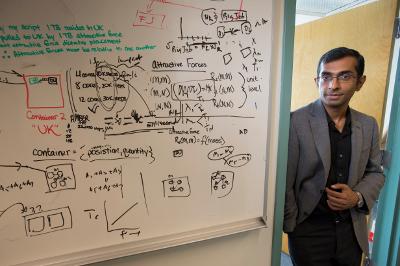Professor Shantenu Jha is a co-PI on a US Department of Energy (DOE) Innovative and Novel Computational Impact on Theory and Experiment (INCITE) award. These highly competitive awards enable access to processor hours on the TITAN Supercomputer. Dr. Jha's award is for 65 Million processor hours for the project entitled "Unraveling autoimmune diseases with adaptive protein simulation” in collaboration with Rice University (lead), Freie Universitat Berlin and Oak Ridge National Laboratory. Using the most powerful academic supercomputer in the US, this project will support the investigation of proteins using advanced statistical and sampling techniques at computational scales that have not been attempted before.
Congratulations Shantenu!
A detailed abstract of the project is below:
The team will explore the molecular basis of autoimmune defects by employing adaptive molecular dynamics and Markov state modeling techniques on leadership supercomputing hardware. The adaptive immune system is responsible for recognizing antigens, which are parts of harmful substances (e.g., toxins, viruses, bacteria), and then neutralizing these substances. Understanding and being able to manipulate the function of the immune system is of utmost importance for society.
Despite its complexity, the immune system is governed by the interactions between only a few key proteins. Out of these, the MHCII is of prominent importance, as it is associated with more diseases than any other region of the human genome. In particular, specific MHCII mutants are responsible for autoimmune diseases, such as arthritis or diabetes. There is experimental evidence that the conformational dynamics of MHCII are key to the understanding of the
molecular mechanism of antigen recognition. Furthermore, it appears that allosteric switches govern the binding of antigens, providing a template for the rational design of drugs for autoimmune diseases.
Understanding molecular mechanisms and conformational transitions is an ideal problem for molecular dynamics (MD) simulations. Previous simulations of this system have been on the 100 nanoseconds time scale. In a preliminary award on Titan, the team has generated simulation data of _300 _s. These results demonstrate the feasibility of the above aims and already reveals interesting yet preliminary biological insights. They now propose to explore conformational transitions of MHCII on timescales of tens of milliseconds. Their scientific results will comprise (1) the molecular mechanism of MHCII as it moves from its “ground state” conformation to antigen-presenting conformations, (2) the molecular mechanisms in dysfunctional and pathological MHCII mutants, and (3) suggestions to interfere with such dysfunction e.g. by the use of drugs that bind to allosteric sites. These results can significantly advance the field of immunology. In addition, we will achieve technological results such as establishing and further developing adaptive sampling and Markov state modeling methods.

